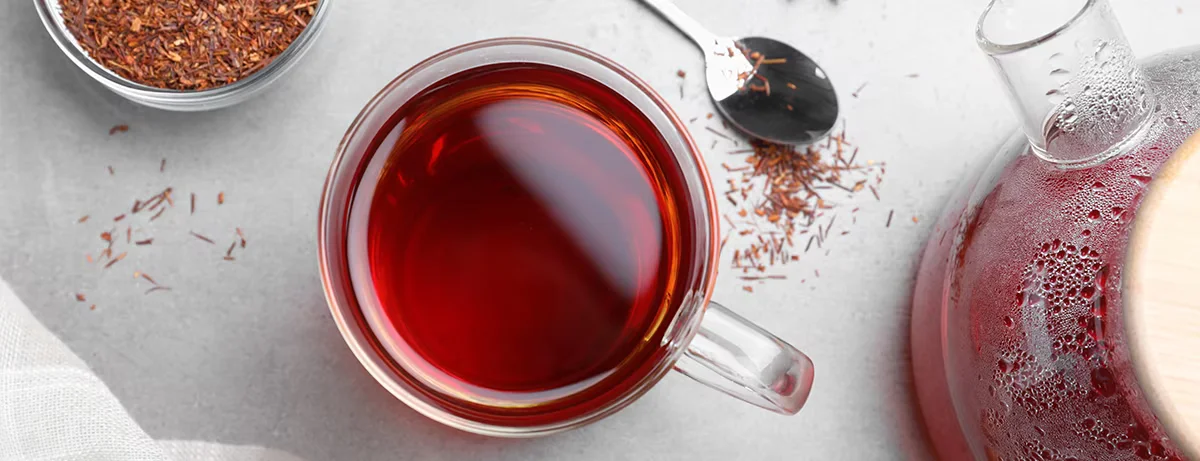Rooibos tea, If you’re on a quest for a delicious and healthful alternative to traditional teas, consider adding red tea to your routine. This South African herbal beverage not only tantalizes the taste buds but also offers a plethora of health benefits. Let’s delve into what makes red Tea a standout choice for wellness enthusiasts.
What is Rooibos Tea?
Rooibos tea, also known as red bush tea, originates from the leaves of the Aspalathus linearis plant, indigenous to South Africa. Unlike traditional teas derived from the Camellia sinensis plant, Rooibos is an herbal infusion, making it naturally caffeine-free.
Health Benefits of Rooibos Tea
1. Low in Tannins and Free from Caffeine
One of the standout features of Red tea is its low tannin content and absence of caffeine. Tannins, which are present in many conventional teas, can hinder the absorption of certain nutrients. With red tea, however, you can indulge in a soothing beverage without worrying about adverse effects on nutrient absorption.
2. Packed with Antioxidants
Rooibos tea boasts a robust antioxidant profile, making it a potent ally in combating oxidative stress. Antioxidants help neutralize free radicals in the body, thereby reducing the risk of chronic diseases and supporting overall well-being. Quercetin, aspalathin, and nothofagin are among the antioxidants found abundantly in red tea.
3. May Boost Heart Health
Regular consumption of red tea has been linked to improved cardiovascular health. The flavonoids present in Rooibos possess anti-inflammatory properties that may help lower blood pressure and reduce the risk of heart disease. Additionally, red tea has been shown to support healthy cholesterol levels by increasing HDL (good) cholesterol and reducing LDL (bad) cholesterol oxidation.
4. May Reduce Cancer Risk
Studies suggest that red tea may exert protective effects against certain types of cancer. The polyphenols found in Rooibos possess anti-cancer properties, inhibiting the growth and proliferation of cancer cells. Furthermore, Rooibos tea contains the antioxidant compound quercetin, which has been shown to induce apoptosis (programmed cell death) in cancer cells, thereby impeding tumor progression.
5. May Benefit People with Type 2 Diabetes
Red tea shows promise in managing blood sugar levels, making it a potentially beneficial beverage for individuals with type 2 diabetes. Research indicates that red tea may improve insulin sensitivity and glucose uptake in muscle cells, leading to better glycemic control. Moreover, the polyphenols in red tea may help mitigate diabetic complications by reducing oxidative stress and inflammation.
Unverified Benefits of Rooibos Tea
While red tea is celebrated for its myriad health benefits, some purported advantages lack robust scientific evidence. These unverified benefits include potential anti-allergic properties, digestive aid, and skin health support. While anecdotal reports suggest these perks, further research is needed to substantiate their efficacy.
Potential Side Effects of Rooibos Tea
Despite its impressive health profile, Red tea may cause adverse effects in certain individuals. Common side effects include:
- Allergic reactions: Although rare, some people may experience allergic responses to Red tea, particularly those with plant allergies.
- Mineral absorption: Rooibos tea contains compounds that may inhibit the absorption of certain minerals like iron and calcium. Individuals with mineral deficiencies should consume Rooibos tea in moderation and consult with a healthcare professional if concerned.
- Pregnancy and Breastfeeding: While Rooibos tea is generally considered safe, pregnant and breastfeeding women are advised to exercise caution due to limited research on its effects during these stages.
Conclusion
In conclusion, Rooibos tea emerges as a versatile and healthful beverage option, offering a range of benefits backed by scientific research. From its antioxidant-rich composition to its potential to support heart health and diabetes management, red tea holds promise as a wellness elixir. However, it’s essential to be mindful of potential side effects and consult with a healthcare provider if you have any concerns. Incorporating red tea into your daily routine may just be the flavorful and nourishing choice your body deserves.
FAQs
- Is Red tea suitable for children?
While red bush is caffeine-free and generally considered safe for children, it’s advisable to consult with a pediatrician before introducing it into their diet. - Can Rooibos tea help with weight loss?
While red bush may support overall health, there’s limited evidence to suggest it directly aids in weight loss. Incorporating Red tea into a balanced diet and exercise regimen may complement weight management efforts. - How should Rooibos tea be brewed for maximum benefits?
To extract the optimal flavor and benefits from the red bush, steep it in freshly boiled water for 5-7 minutes. Avoid over-brewing, as it may result in a bitter taste. - Are there different varieties of Rooibos tea available?
Yes, Red tea is available in various blends and flavors, including green Rooibos and flavored Rooibos teas like vanilla and honeybush. - Can red bush be enjoyed hot and cold?
Absolutely! red bush can be enjoyed both hot and cold, making it a versatile beverage choice for any season or preference.





